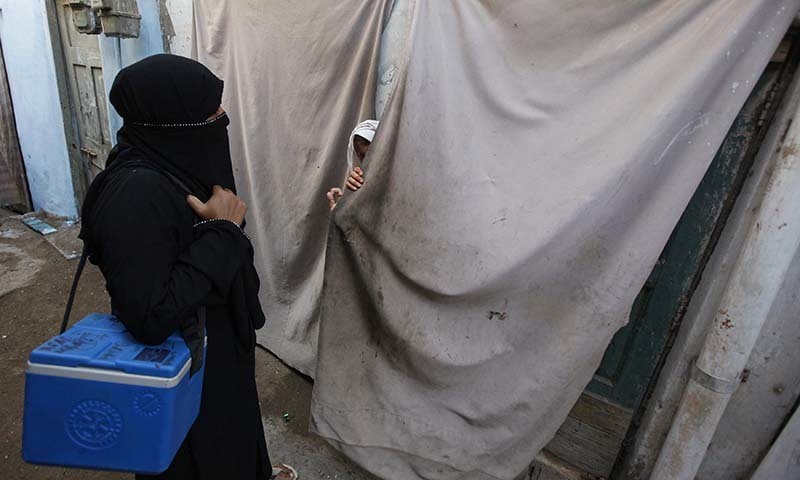PESHAWAR: Although the spread of the polio virus in Pakistan has been largely attributed to the northern tribal areas and Khyber Paktunkhwa province, official data reveals that the country’s main port city of Karachi contributes a sizeable percentage of the crippling virus’s circulation in KP and parts of Fata.
Official statistics available with Dawn.com show that 20 per cent of polio virus circulation in five districts of Khyber Pakhtunkhawa is genetically linked to Karachi, while the metropolis contributes 2 per cent of the crippling disease’s circulation in the Federally Administered Tribal Areas.
The revelation follows the World Health Organisation’s recent warning that Karachi is a pivotal destination to be made polio-free to make the rest of the world safe. The WHO has made it clear that ending polio in Karachi would end the disease not only in Pakistan but in all east Mediterranean nations.
“Karachi serves as an amplifier, exporting wild poliovirus nationally and globally,” it says.
According to the official documents obtained by Dawn.com, the percentage of cases linked to Karachi are 9pc in Peshawar, 74pc in Tank, 66pc in Buner, 100pc in Tor Gar district, and 50pc of cases in Mardan. The data shows that Karachi also has a 2pc polio virus circulation link to Fata cases.
Overall, 6pc of cases from KP and Fata are said to be linked to Karachi.
The data shows that 45pc of all KP and Fata polio cases are linked to North Waziristan agency, 22pc linked to Khyber agency, 10pc to South Waziristan, and 8pc are linked to Peshawar.
Genetic linkages
Explaining how the linkages are established, polio team leader for UNICEF in KP and Fata, Dr Bilal Ahmed said that all types of the polio virus have a specific genetic makeup, and that over a six-month period of testing environmental samples, certain virus types are identified to belong to particular areas.
Dr Bilal Ahmed said that a apart from security concerns related to polio vaccination, the quality of campaigns and access to the affected population may also be key factors for the circulation of the virus from Karachi.
He said that there appeared to be a lack of micro-planning as the records of children entering and leaving the province need to be maintained for effective checks.
 |
| Experts say refusal to administer polio drops is a major problem in the fight against the crippling virus.—Reuters photo |
Responding to the issue, Minister of State for National Health Saira Afzal Tarar said that it was worrisome that cases are also coming from other parts of the country. She said that steps were being taken on a war-footing to put a joint fight against the crippling virus.
She added that the federal government is ready to provide all-out support to the Sindh provincial government in its fight for polio eradication.
She said that a special task force is being set up to evolve a strategy to fight the virus as its reemergence despite 90pc elimination was worrisome for the nation.
Also read: Karachi’s 6pc areas contribute all polio cases in Sindh
Deputy Commissioner Central Karachi Dr Saifur Rehman the administration was taking all out steps to make the polio eradication campaign effective in the metropolis.
He said that the law and order problem was hampering the campaign, but in the Pashto-speaking areas refusal to vaccinate creates further problems.
Pakistan is one of only three countries in the world where the crippling polio virus is endemic.
According to the latest figures, polio cases in Pakistan have reached 235, breaking its 13-year-old record of 199 cases reported in 2000.
The Fata stays on top with 151 cases, KP with 48, Sindh 23, Balochistan 10, and Punjab with only 3 cases.













































